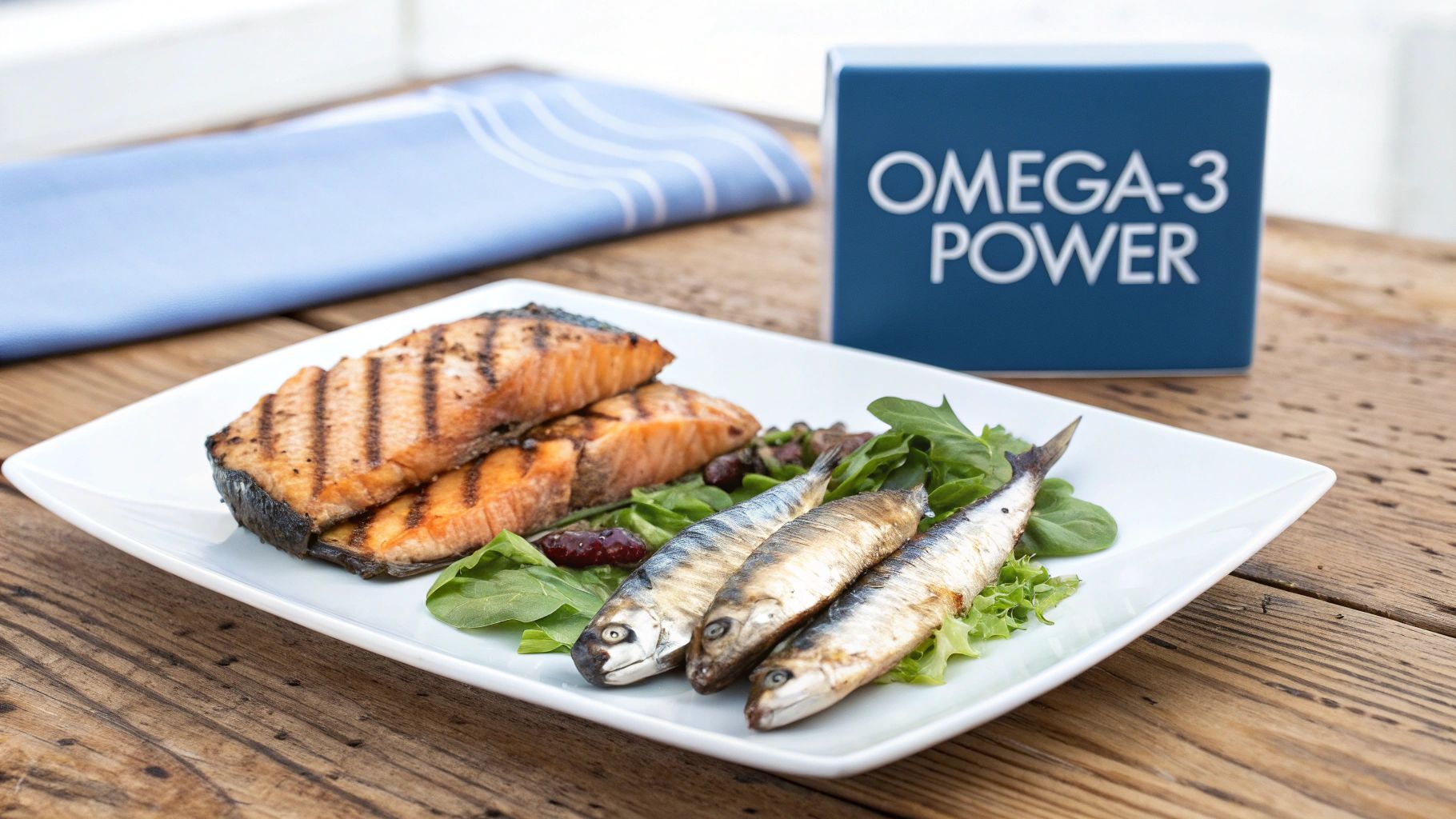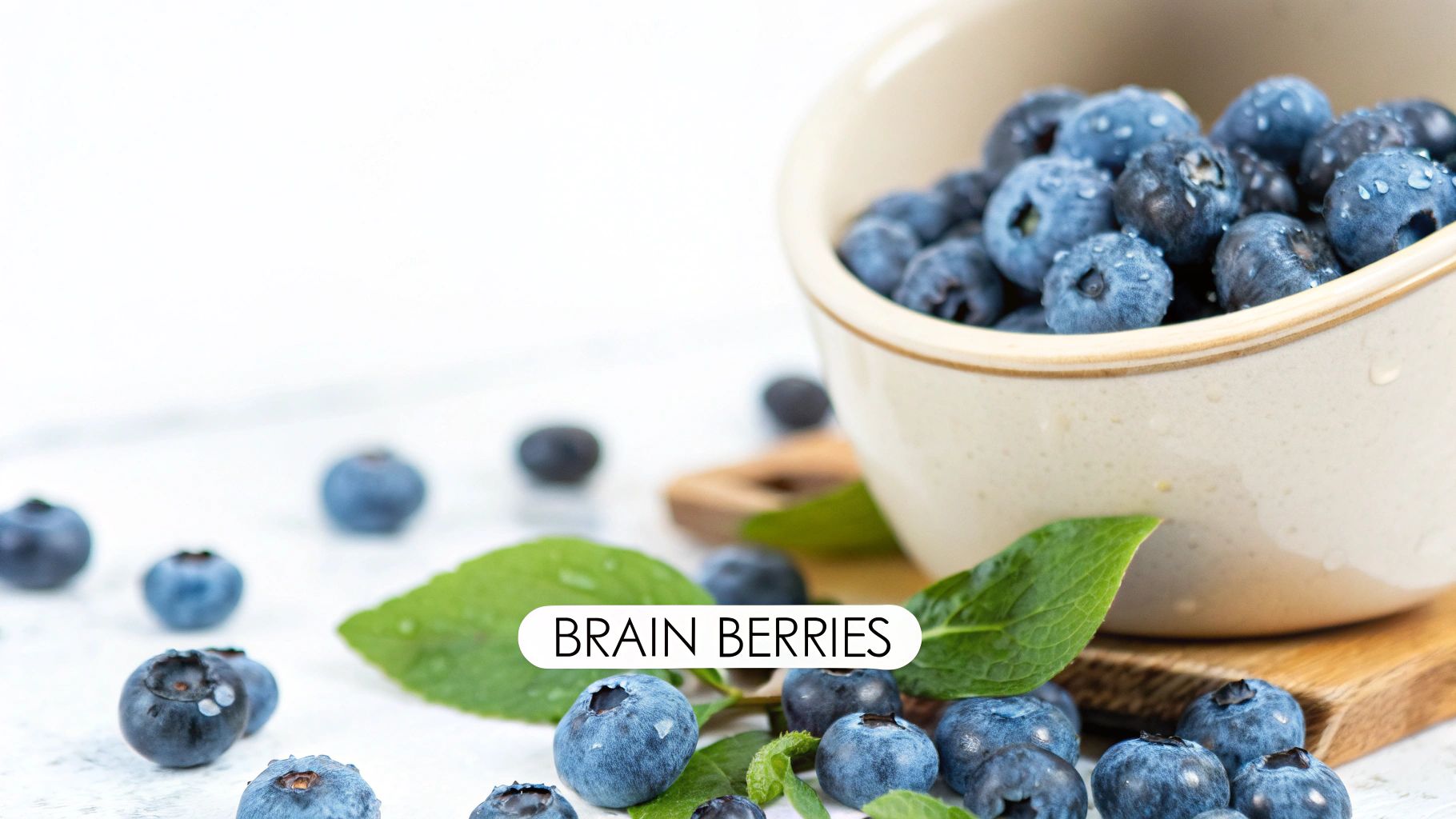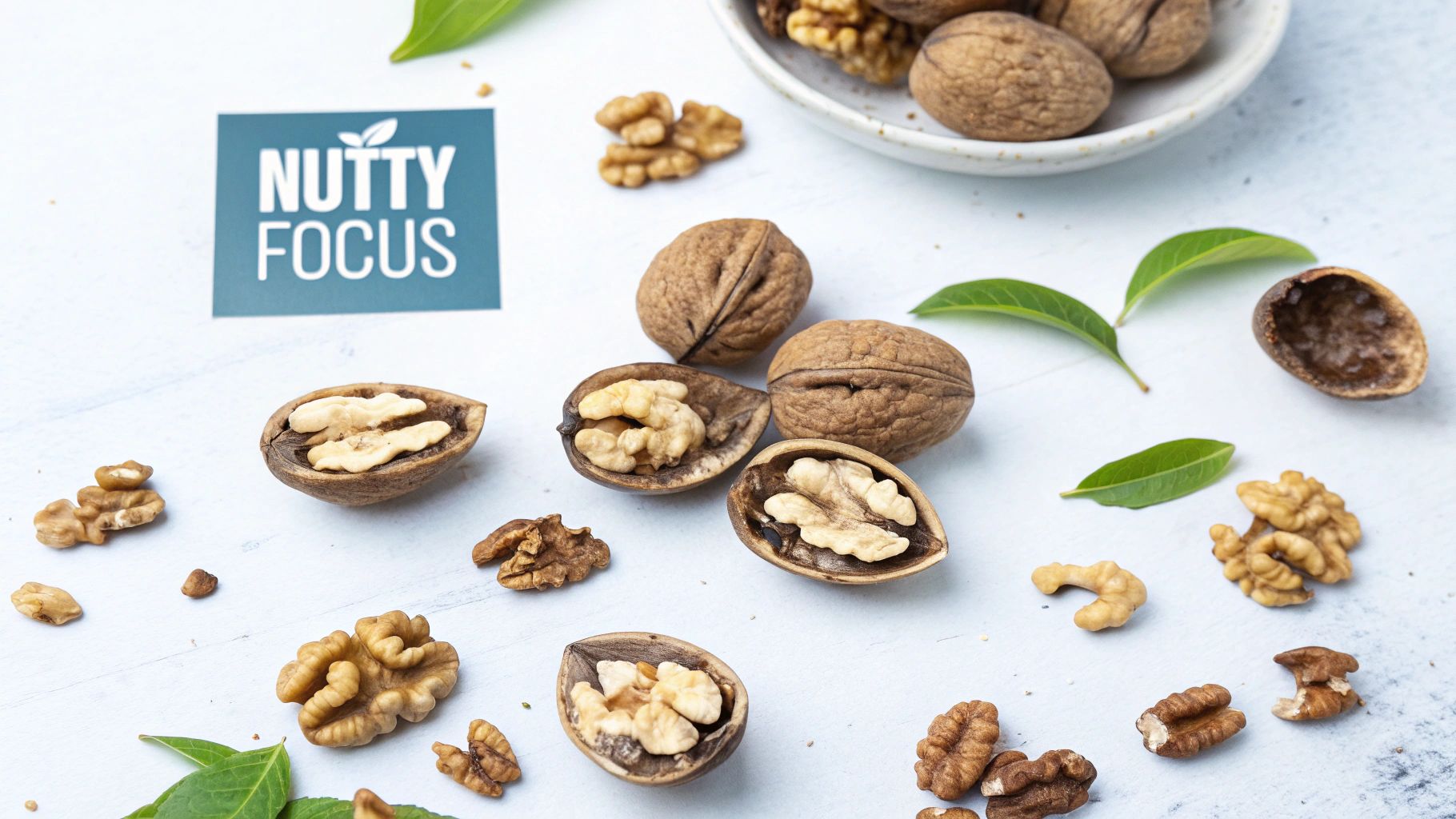Brain fog is more than just a fleeting moment of forgetfulness; it's a persistent haze that can cloud your thinking, impair focus, and drain your mental energy. While many factors contribute to this frustrating state, the food on your plate is one of the most powerful and direct tools for regaining clarity. The right nutrients can combat the underlying inflammation, oxidative stress, and energy deficits that fuel mental fatigue. By strategically choosing what you eat, you can provide your brain with the essential building blocks it needs for optimal function, sharp memory, and sustained concentration.
To truly combat mental fogginess, it's beneficial to first explore its origins. For a deeper dive into the lifestyle and biological factors at play, understanding the common causes of brain fog can provide crucial context for a holistic approach.
This article cuts through the noise and moves beyond generic advice. We will explore a curated list of the most effective foods for brain fog, detailing the specific nutrients that make them so powerful. You'll learn not just what to eat, but why it works and receive practical, actionable tips for incorporating these mind-sharpening foods into your daily meals. Prepare to clear the mental cobwebs and unlock a more focused, vibrant version of yourself.
1. Fatty Fish (Salmon, Mackerel, Sardines)
When seeking powerful foods for brain fog, fatty fish consistently tops the list for good reason. Your brain is composed of nearly 60% fat, and the specific types of fats you consume directly impact its structure and function. Fatty fish are exceptionally rich in omega-3 fatty acids, particularly docosahexaenoic acid (DHA) and eicosapentaenoic acid (EPA), which are integral components of brain cell membranes.

These essential fats perform several critical roles. They help maintain cell membrane fluidity, which is vital for efficient communication between brain cells. Furthermore, omega-3s possess potent anti-inflammatory properties, helping to counteract the neuroinflammation often linked to cognitive issues like brain fog.
Why It Works for Cognitive Clarity
The connection between high fish consumption and cognitive health is well-documented. For instance, populations following a Mediterranean diet, which is abundant in fatty fish, consistently show lower rates of age-related cognitive decline. A single serving of wild-caught Alaskan salmon can deliver between 1,200 and 2,400 milligrams of omega-3s, directly supplying your brain with the building blocks it needs for optimal performance. These fats are crucial for producing neurotransmitters like serotonin and dopamine, which regulate mood, focus, and mental clarity.
Actionable Tips for Integration
Incorporating fatty fish into your diet is straightforward with a few strategic choices:
- Aim for Consistency: Target two to three servings (about 3-4 ounces per serving) of fatty fish per week to maintain adequate omega-3 levels.
- Choose Wisely: Opt for wild-caught fish like salmon whenever possible, as it typically has a superior omega-3 to omega-6 ratio compared to farm-raised varieties. For lower mercury options, smaller fish like sardines, mackerel, and anchovies are excellent choices.
- Preserve Nutrients: Prepare your fish by grilling, baking, or steaming instead of deep-frying. High-heat frying can damage the delicate omega-3 fats, reducing their brain-boosting benefits.
2. Blueberries
Often celebrated as 'brain berries,' blueberries are true nutritional powerhouses and one of the most effective foods for brain fog. Their cognitive benefits stem from a high concentration of plant compounds called flavonoids, particularly a subgroup known as anthocyanins. These potent antioxidants are responsible for the berry's deep blue color and have the unique ability to cross the blood-brain barrier, exerting their protective effects directly within the brain.

Anthocyanins work by combating oxidative stress and inflammation, two key culprits behind diminished mental clarity. By neutralizing free radicals, these compounds help protect delicate brain cells from damage, which in turn supports better communication between neurons. This improved signaling is crucial for sharp memory, focus, and overall cognitive processing speed.
Why It Works for Cognitive Clarity
Research consistently links blueberry consumption to enhanced brain function. For example, studies have shown that daily consumption of just one cup of blueberries can lead to measurable improvements in memory and cognitive performance in as little as 12 weeks. Research spearheaded by scientists like Dr. James Joseph at Tufts University has demonstrated that regular intake, particularly in older adults, can help slow age-related cognitive decline. The high antioxidant capacity of wild blueberries, in particular, has been shown to offer even more concentrated benefits for protecting brain health. You can learn more about nutrition for brain health on cantein.com.
Actionable Tips for Integration
Adding this brain-boosting berry to your diet is both simple and delicious:
- Aim for a Daily Dose: Strive for about a half-cup to one full cup of blueberries daily to reap the cognitive rewards. Consistency is key to building up their protective effects.
- Frozen is Just as Good: Frozen blueberries retain nearly all of their nutritional value, making them a convenient and cost-effective option year-round. They are perfect for smoothies.
- Choose Organic When Possible: Since blueberries have thin skin, they can absorb more pesticides. Opting for organic varieties helps minimize your exposure.
- Incorporate Creatively: Beyond eating them fresh, add blueberries to oatmeal, yogurt, salads, or blend them into a post-workout smoothie for an easy cognitive and nutritional lift.
3. Avocados
Avocados have earned a reputation as a nutritional powerhouse, making them an excellent choice when selecting foods for brain fog. While often praised for their creamy texture and versatility, their real cognitive benefits lie in their rich supply of monounsaturated fats. These healthy fats are crucial for supporting consistent and healthy blood flow, which ensures your brain receives the oxygen and nutrients it needs to function at its peak.
The primary monounsaturated fat in avocados is oleic acid, the same type found in olive oil. Oleic acid is a key component in building and maintaining myelin, the fatty sheath that insulates nerve fibers in the brain. This insulation allows for rapid and efficient communication between neurons, directly combating the sluggish mental processing characteristic of brain fog.
Why It Works for Cognitive Clarity
Research highlights a direct link between avocado consumption and improved cognitive function. One notable study involving older adults found that eating a single avocado daily led to significant improvements in attention and working memory. The high lutein content in avocados, a carotenoid that accumulates in the brain and eyes, is believed to play a protective role against oxidative stress, further enhancing mental sharpness. Hass avocados, in particular, have been shown to contain higher concentrations of these beneficial antioxidants.
Actionable Tips for Integration
Adding avocados to your routine is simple and can yield significant brain-boosting results:
- Mind Your Portions: A daily serving of one-quarter to one-half of an avocado is typically sufficient to reap its cognitive benefits without excessive caloric intake.
- Enhance Nutrient Absorption: Pair avocado with foods rich in vitamin C, like a squeeze of lemon or lime juice over slices. This not only prevents browning but also enhances your body's ability to absorb the avocado's valuable nutrients.
- Speed Up Ripening: If you have an unripe avocado, store it in a paper bag with a banana or an apple. The ethylene gas released by the other fruits will speed up the ripening process.
- Versatile Addition: Mash it onto whole-grain toast, blend it into a smoothie for a creamy texture, or add slices to salads and bowls to easily incorporate it into your meals.
4. Dark Leafy Greens (Spinach, Kale, Swiss Chard)
Often hailed as nutritional powerhouses, dark leafy greens like spinach, kale, and Swiss chard are fundamental foods for brain fog. They are densely packed with a unique array of brain-supporting nutrients, including vitamin K, folate, lutein, and nitrates. These compounds work together to protect brain cells, support healthy blood flow, and provide essential building blocks for cognitive function.
The nutrients in dark greens play distinct yet synergistic roles. For example, Vitamin K is involved in the synthesis of sphingolipids, a type of fat that is densely packed into brain cell membranes. Folate is crucial for neurotransmitter production, while dietary nitrates convert to nitric oxide in the body, which helps dilate blood vessels and improve blood flow to the brain, enhancing mental performance. Their antioxidant and anti-inflammatory properties also combat oxidative stress, a key contributor to cognitive fatigue. You can explore a list of other powerful, natural foods to reduce inflammation on cantein.com.
Why It Works for Cognitive Clarity
The link between leafy green consumption and brain health is strongly supported by research. The MIND diet, a nutritional plan specifically designed for brain health by researchers like Dr. Martha Clare Morris, emphasizes daily consumption of leafy greens. Studies have shown that older adults who consumed just one to two servings of leafy greens daily experienced a slower rate of cognitive decline, equivalent to being 11 years younger cognitively. The high levels of lutein, a carotenoid that accumulates in the brain, are directly associated with better memory and executive function.
Actionable Tips for Integration
Getting your daily dose of dark leafy greens is simple and versatile:
- Set a Daily Goal: Aim for at least one cup of raw or a half-cup of cooked leafy greens each day to meet the recommendations from brain health studies.
- Boost Nutrient Absorption: Many key nutrients in greens, like vitamin K and lutein, are fat-soluble. Pair your greens with a source of healthy fat, such as olive oil dressing on a salad or avocado in a smoothie, to maximize absorption.
- Mind Your Cooking Method: To preserve delicate nutrients like folate, which can be destroyed by high heat, opt for light cooking methods. Gently sautéing or steaming your greens is preferable to boiling them for long periods.
5. Walnuts
Famously shaped like a miniature brain, the walnut’s appearance is a fitting nod to its powerful cognitive benefits. Among all nuts, walnuts are unique for their significant concentration of alpha-linolenic acid (ALA), a plant-based omega-3 fatty acid. This makes them one of the most essential plant-derived foods for brain fog, delivering a potent mix of healthy fats, antioxidants, and protein to support mental clarity.

The ALA in walnuts serves as a precursor to the long-chain omega-3s EPA and DHA, although the conversion is limited. More importantly, ALA itself possesses strong anti-inflammatory and antioxidant properties that protect brain cells from oxidative stress. Walnuts also contain other neuroprotective compounds, including vitamin E, folate, and polyphenols like ellagitannins, which work together to reduce inflammation and enhance neural signaling.
Why It Works for Cognitive Clarity
Research consistently highlights the link between walnut consumption and improved brain function. A notable UCLA study found that adults who ate walnuts showed improved performance on cognitive tests, regardless of age or gender. Similarly, research involving college students demonstrated that regular walnut intake was associated with better inferential reasoning skills, a key component of clear thinking. As a staple in the brain-protective Mediterranean diet, walnuts are recognized for their role in preserving long-term cognitive health and fighting the mental sluggishness associated with brain fog.
Actionable Tips for Integration
Making walnuts a regular part of your diet is a simple yet effective strategy for boosting brainpower:
- Aim for a Daily Handful: A serving size of just one ounce (about 14 walnut halves) is enough to provide the recommended daily intake of ALA and other key nutrients.
- Store for Freshness: Walnuts' high fat content makes them susceptible to going rancid. Store them in an airtight container in the refrigerator or freezer to preserve their flavor and nutritional value.
- Enhance Digestibility: To improve digestion and nutrient absorption, you can soak raw walnuts in water overnight and then rinse them before eating.
- Incorporate Creatively: Add chopped walnuts to your morning oatmeal, yogurt, or salads for a satisfying crunch. They also work well blended into smoothies or simply eaten as a standalone snack.
6. Dark Chocolate (70% Cacao or Higher)
Indulging in high-quality dark chocolate can be more than just a treat; it's a strategic move when looking for foods for brain fog. The key lies in its high concentration of cacao, which is packed with powerful plant compounds called flavonoids, particularly epicatechin. These flavonoids have been shown to have a significant positive impact on cerebral blood flow, delivering more oxygen and nutrients to your brain.
This enhanced circulation helps improve various aspects of cognitive function, including attention, processing speed, and memory. The unique combination of these potent antioxidants and a mild dose of natural stimulants like theobromine and caffeine works to gently lift mental fatigue and sharpen focus, making it an excellent ally against cognitive sluggishness.
Why It Works for Cognitive Clarity
The science behind dark chocolate's brain-boosting effects is compelling. Research, including studies like those highlighted by Harvard Medical School’s Dr. Norman Hollenberg, shows that flavanol-rich cocoa can directly improve cognitive performance. Some studies even suggest that the cognitive benefits, such as improved attention and working memory, can be observed within a couple of hours of consumption. The flavonoids work by stimulating nitric oxide production, which relaxes blood vessels and improves blood flow, directly benefiting brain function and neuroplasticity.
Actionable Tips for Integration
To harness the cognitive benefits of dark chocolate, it’s important to be selective and mindful of your intake:
- Go for High Cacao Content: Choose chocolate with 70% cacao or higher. Higher percentages mean more flavonoids and less sugar, maximizing the brain health benefits.
- Practice Portion Control: A little goes a long way. Limit your daily intake to a small square or about 1 ounce (28 grams) to get the benefits without excess calories or sugar.
- Time It Right: Consume your dark chocolate earlier in the day. The small amount of caffeine and theobromine can provide a mental lift for your afternoon tasks but might disrupt sleep if eaten too close to bedtime.
- Check the Label: Look for minimally processed and organic options to avoid unnecessary additives and ensure a higher quality of flavonoids.
7. Green Tea
For those seeking foods for brain fog that offer a gentle yet effective lift, green tea is a standout choice. It contains a unique synergistic duo of caffeine and L-theanine. This combination delivers focused alertness without the jitters or subsequent crash often associated with other caffeinated drinks. Green tea is also packed with powerful antioxidants called catechins, most notably epigallocatechin gallate (EGCG), which protects brain cells from oxidative stress and inflammation.

The L-theanine in green tea increases alpha brain wave activity, promoting a state of "calm focus." It also boosts the production of calming neurotransmitters like GABA and dopamine. This balanced neurochemical environment is ideal for cutting through mental haze and enhancing cognitive function.
Why It Works for Cognitive Clarity
The cognitive benefits of green tea are supported by both traditional use and modern science. For centuries, Japanese and Chinese cultures have revered it for promoting mental clarity. Research now confirms this, with studies demonstrating that regular green tea consumption can improve working memory, processing speed, and attention. The antioxidants, particularly EGCG, help reduce cellular damage and support long-term brain health.
For an even more concentrated dose of these benefits, matcha, a powdered green tea, provides the entire leaf's worth of nutrients. For an enhanced cognitive boost, some modern blends incorporate other functional ingredients. For example, you can find Lion’s Mane Matcha to boost focus and mental performance, combining the power of green tea with a mushroom known for supporting cognitive function.
Actionable Tips for Integration
Getting the most out of green tea is simple with a few best practices:
- Aim for Consistency: Drink two to three cups daily to maintain a steady supply of L-theanine and antioxidants.
- Brew Correctly: Steep your green tea in water that is hot but not boiling (around 160-180°F or 70-80°C) for 3-5 minutes. This prevents bitterness and preserves the delicate catechins.
- Time Your Sips: To maximize iron absorption from meals, it’s best to consume green tea between meals rather than with them.
- Choose Quality: Opt for high-quality, organic green tea whenever possible to minimize exposure to pesticides and ensure a richer nutrient profile. Many of its compounds are also available in concentrated forms; you can explore other options by learning more about top supplements for cognitive function.
Brain Fog Food Benefits Comparison
| Item | Implementation Complexity 🔄 | Resource Requirements ⚡ | Expected Outcomes 📊 | Ideal Use Cases 💡 | Key Advantages ⭐ |
|---|---|---|---|---|---|
| Fatty Fish (Salmon, Mackerel, Sardines) | Moderate: Requires cooking and storage | Moderate: Needs fresh/wild-caught fish | Strong cognitive improvement, memory & focus boost | Regular meals, anti-inflammatory diets | High omega-3 content, long-term brain health |
| Blueberries | Low: Ready-to-eat, minimal prep | Low: Seasonal but widely available | Immediate & long-term protection from oxidative stress | Snacks, smoothies, easy daily consumption | Highest antioxidant capacity, versatile |
| Avocados | Low: Raw consumption, simple prep | Moderate: May be costly & perishable | Supports blood flow, mental clarity, stable blood sugar | Raw dishes, keto and heart-healthy diets | Healthy fats, potassium-rich |
| Dark Leafy Greens (Spinach, Kale, Swiss Chard) | Low-Moderate: Washing, cooking or raw | Low: Widely available, inexpensive | Improves cognitive function via nutrients & blood flow | Salads, cooked dishes, smoothies | Nutrient-dense, low calorie |
| Walnuts | Low: Ready-to-eat, minimal prep | Low-Moderate: Storage needed | Supports brain health, sustained energy | Snacks, baking, salads | High omega-3 among nuts, convenient |
| Dark Chocolate (70% Cacao or Higher) | Low: Ready-to-eat | Low: Widely available | Immediate cognitive boost, mood enhancement | Small daily treats, focus aid | Flavonoids + mild caffeine, enjoyable |
| Green Tea | Low: Brewing required | Low: Affordable and widely accessible | Calm alertness, antioxidant brain protection | Multiple daily servings, calm focus | L-theanine + caffeine synergy, antioxidant-rich |
Your Action Plan for Lasting Mental Clarity
Navigating the haze of brain fog can feel disorienting, but reclaiming your focus is more achievable than you might think. As we've explored, the path to a clearer mind isn't about finding a single 'miracle' cure. Instead, it lies in the consistent, intentional practice of fueling your brain with the right nutrients. The foods we've detailed, from the omega-3 powerhouses like salmon and walnuts to the antioxidant-rich blueberries and dark leafy greens, all work synergistically to support optimal cognitive function.
Each food offers a unique set of tools to combat inflammation, enhance blood flow, and protect delicate brain cells from oxidative stress. Avocados provide healthy monounsaturated fats for neuronal health, while the flavonoids in dark chocolate and the L-theanine in green tea can sharpen focus and improve mood. The core principle is simple: what you place on your plate directly impacts the clarity and performance of your mind. By making conscious dietary choices, you are actively building a more resilient and efficient brain.
From Knowledge to Action: Your First Steps
The most powerful information is that which is put into practice. To avoid feeling overwhelmed, start small. Your goal isn't to perfectly overhaul your diet overnight but to build sustainable habits that lead to lasting change.
Here is a simple, actionable plan to begin integrating these powerful foods for brain fog into your routine this week:
- Choose Your Focus: Select just one or two foods from the list that appeal most to you. Perhaps you start by swapping your usual afternoon chips for a handful of walnuts or adding a generous serving of spinach to your morning smoothie.
- Plan Your Meals: Dedicate a few minutes to think about where you can incorporate these foods. Could you top your morning oatmeal with blueberries? Or maybe prepare a salmon salad for lunch one day this week?
- Observe and Adjust: Pay close attention to how you feel. Do you notice a subtle lift in your energy or focus a few hours after your meal? This bio-feedback is crucial for building motivation and understanding what works best for your unique body.
A Holistic Approach to Cognitive Wellness
While nutrition is a foundational pillar for fighting brain fog, a truly holistic approach yields the most profound and lasting results. The connection between your gut, your diet, and your mental state is undeniable. However, external stressors and a lack of mental restorative practices can undermine even the best nutritional strategy.
To supplement your dietary changes, it's beneficial to adopt effective techniques for mental calmness and peace of mind. Practices like mindfulness, meditation, or even simple breathing exercises can significantly reduce the cortisol levels that contribute to mental fatigue. Combining a brain-supportive diet with these mental wellness tools creates a powerful synergy, equipping you to not only clear the fog but also build a fortress of cognitive resilience. Your journey to peak mental performance is a multifaceted one, and every positive step, whether on your plate or in your mind, is an investment in your long-term health and vitality.
Ready to supercharge your brain-boosting smoothies and meals? Cantein offers a premium, plant-based hemp protein powder that is rich in brain-supportive nutrients, including omega fatty acids and complete amino acids. Add a scoop of Cantein to your daily routine for a clean, powerful, and convenient way to fuel your journey toward lasting mental clarity.

